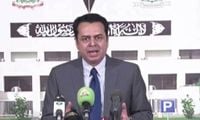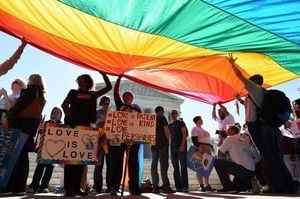Mobile internet services went dark across Islamabad and Rawalpindi this week as authorities scrambled to contain potential unrest ahead of a major anti-Israel protest planned by the Tehreek-e-Labbaik Pakistan (TLP). The government’s preemptive measures, which included a heavy police presence, road blockades, and sweeping restrictions on public gatherings, underscored the tense atmosphere that has gripped Pakistan’s capital and its twin city amid ongoing turmoil in the Middle East.
The disruption began at midnight on October 9, 2025, when the Pakistan Telecommunication Authority (PTA) suspended all 3G and 4G mobile data services in the two cities. According to a report by The Express Tribune, this blackout was set to last until 10pm on October 10, coinciding with the day of the TLP’s scheduled “Ya Aqsa Million March” demonstration outside the United States Embassy in Islamabad.
Interior Minister of State Talal Chaudhry, speaking outside the US embassy on October 9, told reporters that the TLP had not sought official permission to stage its protest. “When did the TLP seek permission, when did it give assurances of following SOPs (standard operating procedures)?” he asked, as quoted by Dawn. Chaudhry went on to criticize the party’s leadership for what he described as “inflammatory and abusive” rhetoric. “The people of Palestine do not want sloganeering; they want peace. They want their homeland. Such so-called protests, speeches are not needed,” he said, emphasizing the government’s stated policy of permitting only peaceful, law-abiding demonstrations.
Authorities had already imposed Section 144 across Islamabad and Rawalpindi from October 8 through the morning of October 11. This sweeping order banned public rallies, processions, sit-ins, assemblies, pillion riding on motorcycles, and even the use of loudspeakers for public speeches deemed inflammatory. The measure, enforced with the help of local police and district administration, was intended to prevent mass gatherings that could spiral out of control.
Security preparations were particularly tight in Islamabad’s Red Zone, the city’s administrative and diplomatic heart. Over 70 shipping containers were deployed at key entry points—including the heavily trafficked Faizabad Interchange—to block access and deter crowds. The Islamabad Capital Territory (ICT) police were instructed to seal both the Red Zone and the Extended Red Zone, while Metro Bus services were suspended until the end of Friday, October 10. The ripple effect was felt by thousands: universities and schools in both cities were closed for the day, with district officials citing concerns over law and order as the reason for the impromptu holiday.
The government’s anxiety was not without cause. Tensions had already flared the previous night, when police launched a raid on the TLP’s headquarters in Lahore in a bid to arrest the party’s chief, Saad Rizvi. According to The Express Tribune and Dawn, the operation met fierce resistance. TLP supporters, armed with iron rods and stones, clashed with officers on Multan Road, injuring at least three police constables. Police responded with tear gas, turning the area into what witnesses described as a battleground. The authorities later seized gas masks, chemicals, and other supplies from TLP workers—items that, according to Chaudhry, were meant for use during the planned protest in Islamabad.
The unrest was not limited to Lahore. Police claimed that large numbers of TLP supporters had already reached the capital region, taking up positions in temporary shelters and launching attacks on police parties during further raids. On October 8, the TLP issued a statement alleging that several of its workers had been detained in overnight sweeps at their homes. In Rawalpindi, the City Police Officer, Syed Khalid Hamdani, convened a high-level meeting to review the law and order situation. “No person is allowed to take the law into their hands under any circumstances,” Hamdani declared, as reported by Dawn. “Blocking any road, traffic or any activity affecting the normal life of citizens will not be allowed.”
To further tighten control, authorities ordered hostels and hotels along Murree Road and in surrounding areas to evacuate all non-essential individuals, making exceptions only for foreigners, patients, families, and students sitting for exams. The crackdown extended to the courts as well: on October 7, two TLP workers were arrested by Chaklala police for allegedly transporting “dangerous items for a violent protest and rally of a religious political party.” The suspects were remanded in police custody for ten days by a Rawalpindi Anti-Terrorism Court, pending further investigation.
Despite the government’s hard line against what it viewed as unauthorized and potentially violent protests, officials pointed to examples of permitted demonstrations. On October 10, the Jamaat-i-Islami held a student rally near Islamabad’s Faisal Mosque in solidarity with Palestine and the people of Gaza; permission for this event was granted in advance, according to Chaudhry. The contrast was meant to reinforce the government’s position that it supports peaceful assembly, provided organizers follow established procedures and guidelines.
Underlying the local drama was a significant international development. On October 9, Hamas and Israel signed a ceasefire agreement, which included the release of Israeli captives in exchange for Palestinian prisoners. This deal, part of a broader initiative championed by US President Donald Trump, was hailed by Islamabad as an “historic opportunity” for peace in the Middle East. Chaudhry, referencing the ceasefire, questioned the rationale behind the TLP’s continued agitation: “Hamas has accepted the agreement, then why do those who want to protest not accept peace?” he asked pointedly at the press conference.
As the day of the planned TLP rally arrived, the heavy-handed security measures appeared to have succeeded in preventing large-scale violence, though at the cost of significant disruption to daily life. The closure of schools, suspension of transport, and blanket internet shutdown left many residents frustrated and anxious. Yet, for officials, the priority remained clear: “Those who create disturbance in peace and order or violate the law will be dealt with strictly,” CPO Hamdani warned, adding that attacks on the lives and property of citizens or law enforcement agencies would not be tolerated under any circumstances.
In the end, the events in Islamabad and Rawalpindi this week reflected the delicate balance authorities must strike between upholding the right to protest and maintaining public order in a volatile environment. As the region continues to watch developments in the Middle East, Pakistan’s leaders are clearly determined to keep a firm grip on the streets at home.




